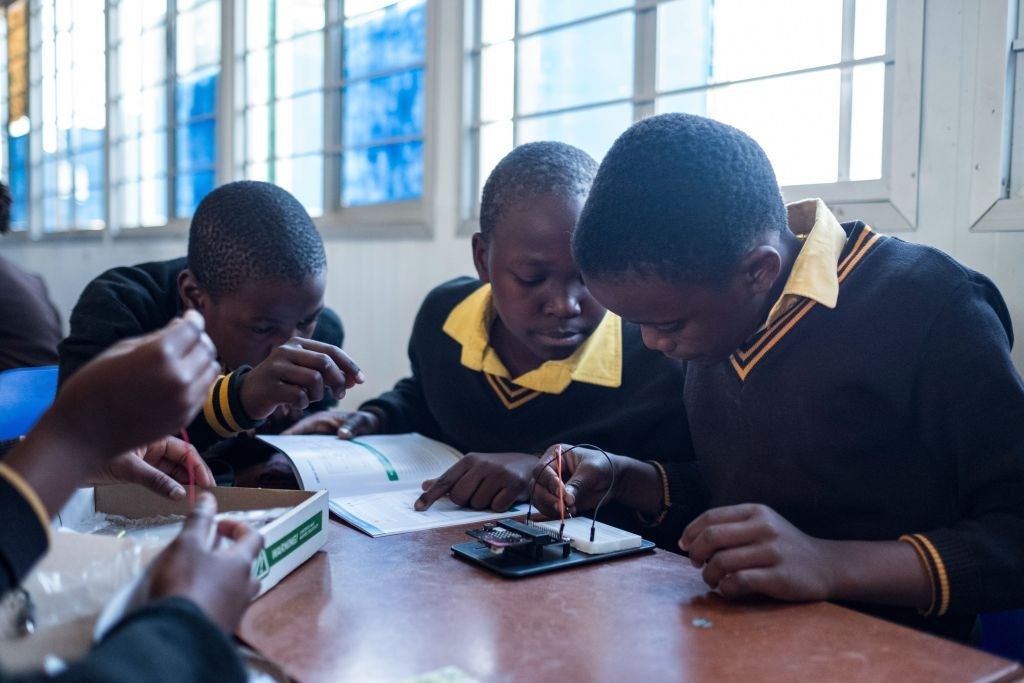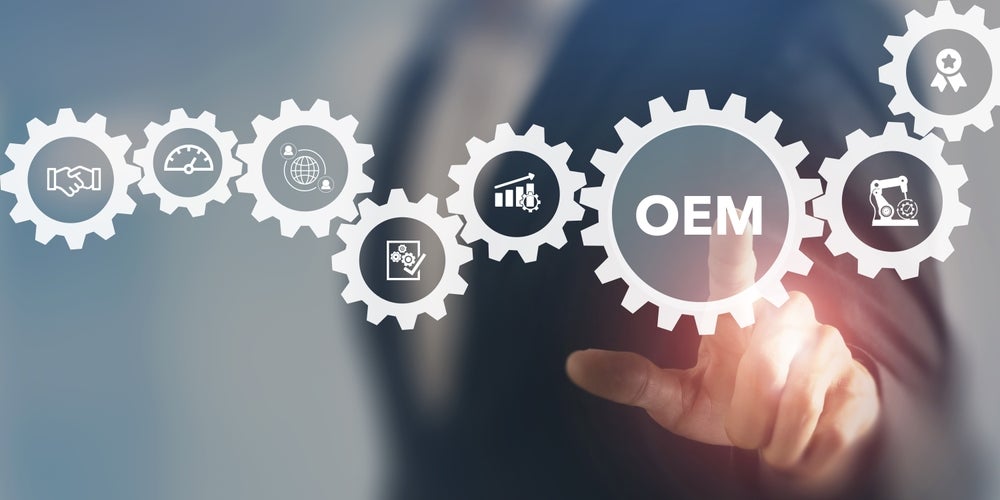
The pace at which automation, AI and robotics is being adopted in Africa will inevitably accelerate during the next decade but it could result in a huge number of economic winners and losers in the region.
The Fourth Industrial Revolution (industry 4.0) is gathering pace around the world, and Africa, the world’s poorest continent, cannot cut itself off from the technological transformation. Industry 4.0 refers to a combination of internet-connected technologies that are integrating with our physical lives, blurring the boundaries between the physical world and the digital world. They include the internet of things (IoT), cloud computing, Big Data, robotics and AI. These technological changes are on course to significantly impact all industries and economies, including in Africa.

Access deeper industry intelligence
Experience unmatched clarity with a single platform that combines unique data, AI, and human expertise.
Africa and IoT
IoT is an overarching technological term representing a network of devices capable of collecting data, sharing data over the internet and sourcing information for users with ease. Many IoT devices also resemble robots, able to assist in household chores and using sensors to monitor health, movement and visitors at the door. Consumer electronics, smart cities, smart homes, intelligent industrial applications and automation are leading to the widespread adoption of IoT.
By 2025, there will be 55.7 billion digitally connected devices in circulation globally, 75% of which will be connected to an IoT platform, according to IDC, a market intelligence company. Moreover, the Africa and Middle East IoT market is second only to Asia-Pacific in its rate of growth, driven by utilities, government and manufacturing verticals. According to GlobalData, IoT revenue in the region is set to double to $20bn by 2023. The IoT market size in South Africa, the region’s most advanced economy, is expected to grow to $31.6bn by 2028 from $4.98bn in 2022, according to market research company Insight Partners. It will expand at an estimated compound annual growth rate of 36% during the same period.
With industry 4.0 spreading far and wide, the potential exists in Africa to create many new jobs and provide fresh solutions to a large number of the region’s key issues by embracing these new forms of technology. Furthermore, companies throughout the world have found measurable business value by adopting IoT technology – ranging from improved business productivity and process efficiency to improved customer experiences, product quality and cost efficiency. Technology has brought higher labour productivity to many sectors by reducing the demand for workers for routine tasks. The new technologies can also create jobs, as they shape the demand for new goods and services.
However, many Africans regard automation and robots with suspicion. Although many new jobs could be created for more tech-literate workers and those with the right skill set, many Africans depend on traditional, manual labour and there is a risk that it will be less required in the future. They fear that automation will replace people. Informal employment stands at more than 70% of the population in sub-Saharan Africa, according to the World Bank. Youth unemployment in South Africa is already at 66.5%, according to Stats SA. Workers displaced by automation or robots will have to retool to survive and that will be a difficult thing for many people to do.

US Tariffs are shifting - will you react or anticipate?
Don’t let policy changes catch you off guard. Stay proactive with real-time data and expert analysis.
By GlobalDataThe mechanisation of agriculture in emerging economies represents the largest global shift in work. Cities in emerging countries must generate abundant new jobs to employ the farmers displaced by the industrialisation of agriculture.
Fruits of industry 4.0 will not be evenly distributed
Furthermore, there is a danger that the new jobs generated by industry 4.0 will not be evenly distributed between all income brackets, leading to a more socially divided region. Some high-tech workers will benefit handsomely but others could lose their employment altogether. It could also lead to huge cultural differences in the type of jobs carried out in the region – a lot of people will remain subsistence farmers, for example, but will rub shoulders with people who know how to programme robots. There could be a premium on skills that cannot be replaced by robots – general cognitive skills such as critical thinking and socio-behavioural skills such as managing and recognising emotions that enhance teamwork.
Workers involved in routine tasks that are ‘codifiable’ would appear to be the most vulnerable as the cost of machines declines. More than two-thirds of robots are employed in the global automotive, electrical and electronics, and metal and machinery industries. Displaced workers are likely to compete with other low-skill workers for jobs with low wages.
Moreover, industry 4.0 faces myriad obstacles in Africa – a lack of funding and technical expertise, a shortage of hardware, expensive data charges, low levels of technological awareness, an inadequate ecosystem of digital solution providers and power cuts. Furthermore, there is a lack of understanding around the business benefits of IoT, concerns around cybersecurity and privacy and difficulty proving the return on investment. Africa suffers from a massive skills shortage in data sciences, but the global shortage of semiconductor chips is another hurdle.
“There are robotics and AI enthusiasts throughout the continent,” says Michael Leventhal, founder of RobotsMali, the national centre for education in robotics and AI in Mali. “In the universities, we are trying to build something; it is laughable if you compare it with Europe, Asia and the US, but everyone is aware that Africa cannot afford to be left behind.”
He adds that a lot of the most interesting work in automation and robotics is taking place in Europe, the US and Asia and, if the technological know-how does not exist in Africa, many talented young Africans will seek jobs in the developed world. “The brain drain is the biggest problem I have seen in Mali,” says Leventhal. “Every one of my brilliant students goes abroad because there is nowhere to get an advanced education here.
“You have cheap labour on this continent and you would think that is a big advantage, but now everything is built with automation, robotics and AI, which is a productivity accelerator. To get around the lack of supply of electricity here, everyone has diesel generators, but fuel costs are much higher now. Furthermore, you do not have a competent workforce. Mali and most countries in Africa cannot compete on the world market. We must master the same techniques that are used in other countries to produce good, reliable, high-quality product at a low price. Right now, that is inconceivable without high levels of automation and robotics technology.”
Start-ups are deploying the new technologies first
Internet traffic is doubling every 18 months in Africa and, in terms of mobile broadband, Africans are quickly transitioning from 3G to 4G. Hyper-scalers including Google and Facebook are investing massively to improve African connectivity by expanding the undersea cable networks.
However, the cost of data is one of the biggest stumbling blocks for the adoption of IoT in the region. In rural Africa, the Global System for Mobile Communications and the General Packet Radio Service and 4G are very costly for IoT devices. Instead, short-range technologies such as IEEE 802.15.4 can be used by administering multi-hop routing. Transmitted-receivers (in other words, wireless communications devices) consume an enormous amount of power in a radio node and, as long-distance transmission needs immense power, multi-hop routing could be a more energy-efficient option than single-hop routing.
Telecommunications, financial services, manufacturing, logistics, transport and the government sectors are leading the way in terms of IoT adoption in Africa. Manufacturing is already using IoT to streamline efficiencies and capabilities. The sector will likely continue to use IoT and AI algorithms to deliver value through data aggregation and analytics. On the consumer front, vehicular IoT applications and smart home devices are gaining traction, while in the public sector, municipalities are adopting IoT for intelligent transportation and public safety enhancements.
Start-ups are at the forefront of industry 4.0 in Africa. The ‘uberisation’ of Africa continues apace and many new start-ups are based on software that uses AI to optimise decision-making. Fintechs in Nigeria, Ghana, Kenya and many other African countries are using this technology. For example, over time, AI is capable of learning who to lend money to and who not to.
Illuminum Greenhouse in Kenya is a start-up focusing on IoT solutions for agriculture. Its greenhouses are powered by solar panels and sensors, which work together to create an optimal environment for growing crops. When the sensors detect that the crops need water as the soil becomes dry, an automated watering system supplies the precise amount of water required. It is building cost-efficient greenhouses suitable for farmers of smalls areas of land. They also promote the local economy by only using locally available materials and solar-powered sensors.
Technology increases proximity to markets, making the creation of new, efficient value chains easier. In Ghana, Farmerline is an online platform that communicates with a network of more than 200,000 farmers in their native languages via mobile phone. It provides information on the weather and market prices, while collecting data for buyers, governments and development partners. The company is expanding to include credit services.
Drones start to take off in Africa
The ThirdEye project is supporting farmers in Mozambique and Kenya with their decision-making in farm and crop management by setting up a network of drones or flying sensor operators. It helps farmers to make informed decisions about the use of limited resources including water, seeds, fertiliser and labour.
Fuel pipelines can be fitted with sensors to monitor for leaks, while motion sensor cameras on remote assets can be used to alert responders to potential security breaches. In a city such as Lagos, which faces significant traffic challenges, smart sensors can be used to collate traffic flows and make traffic routing decisions based on real-time data. Companies in the logistics and transportation business can use embedded devices to track the location of their vehicles and optimise route allocation.
In the home, smart, interconnected devices can help the occupants improve energy efficiency by turning air-conditioning systems and lights on or off based on the tracking of variables such as light intensity, motion sensing, and temperature. IoT is also expected to massively transform areas such as replenishing goods. Devices such as a connected fridge that can automatically re-order milk, cheese or any other product that is running low are being introduced by major electronics manufacturers such as Samsung and LG.
Retail is also ripe for the adoption of IoT technology. Radio frequency identity tags – which use intelligent barcodes to track items in a retail environment – make stock-keeping and monitoring a much easier task for the retailer. Already, Rwanda is matching SIM cards to bank accounts, offering retailers the ability to take payment from customers in remote areas.
Zipline is a US company that designs, manufactures and operates delivery droves. It operates distribution centres in a number of African countries including Rwanda and Ghana. Its drones deliver whole blood, platelets and frozen plasma.
Additionally, e-commerce platforms are rapidly increasing due to the ease of shopping and growing smartphone penetration in the market, which is likely to propel the South Africa IoT market, for example. The growing need for data analysis and integration of analytics is driving the use of IoT in the South African market.
“It is important for us to join the global train of advancement,” says Victor Orjiugo, sales engineer at Robotics and Tech Africa, a Lagos-based company that trains people with the skills needed in the transition to industry 4.0.
“There are a lot of fintech companies in Nigeria, and although we are doing well in that sector, we must prepare ourselves for the coming trend, which is robotics and AI. The market does not look very good for these technologies at the moment because deployment is very slow as a result of a number of factors including policy, education and the digital divide.
“People are worried that robotics and AI could cause increasing unemployment in the manufacturing sector, in particular, but this is a problem that can be solved. If we look at African youth, at advancing our manufacturing base, if we try to become a more productive continent, we make things ourselves, we become more involved in producing commodities for export, an increase in the employment share of the manufacturing industry will take place. Then, if robots have to be introduced, it would not really be much of a problem for the unemployment rate.”
The unstoppable rise of IoT?
Andile Ngcaba, chairman of Convergence Partners, a South Africa-based investment company focused on the technology, media and telecoms sector, says: “Today, Africa has one billion mobile phone connections. If experts had predicted that 30 years ago, people would have asked: ‘What are you smoking?’ I believe that by the year 2030, the IoT will be a massive market in Africa. Some ten billion devices – including cars, cameras, sensors, laptops, you name it – will be connected to the internet in Africa. It will be the second most digitalised continent after Asia, owing to the fact that the average age in Africa is so young.”
Cloud computing is one of the key catalysts of industry 4.0. It accelerates business efficiency through its capacity to drive contingency, scalability, almost real-time data availability and a reduction in on-site skills required to manage complex environments. For Africa, the cloud provides the means for organisations across the continent to embrace automation and develop cloud strategies that will not only improve their efficiency and competitiveness but future-proof their growth prospects.
Developing the industrial internet of things (IIoT) would help diversify South Africa’s economy by expanding its manufacturing sector and capitalising on a strong IT sector. IIoT refers to interconnected sensors, instruments and other devices networked together with computers' industrial applications including manufacturing and energy management.
“Technology is a double-edged sword, depending on how you use it,” says Victor Paul Kawagga, a robotics technology consultant at Oysters and Pearls, a tech education NGO based in Uganda. “As much as technology comes with some disadvantages – such as cutting employment – we should not perceive it from the negative side. I see technology as an opportunity.
“For example, Africa is very dependent on agriculture. The youth tend to look at agriculture, the way that it is done in Africa, as a dirty activity, so it is something that is left to the edge in the most cases. Lots of youth do not want to do agriculture. In Uganda, we have been experimenting with vertical farms, farms that occupy a number of floors within a kind of factory. It takes place in an enclosed environment where you do not have the different seasons. There are microcomputers to control lighting, the water level and the humidity. By embracing this kind of farming in Africa through automation, it is a way of attracting the youth back into agriculture because they can now access the farm on their smartphones.”
In Africa, he adds, there is a lot of politics impacting technological advancement. “We need to get [younger people] more involved in politics," says Kawagga. "For two years during lockdown, while I was developing a medical robot, I used to reach out to professors at the government universities and people at the Ministry of ICT, but they were telling me, 'it is stuff for the whites, it is not really for Africa'. Their assumption was that if I am doing it, I must have ‘whites’ behind me, funding me, so I don’t need further funding from the government.”
5G's slow take-off in Africa
The African internet economy has the potential to add up to $180bn to the region’s gross domestic product by 2025 – depending on the usage intensity of digital technologies by businesses – according to e-Conomy Africa 2020, a joint report by Google and the International Finance Corporation. Africa has the world’s youngest and fastest-growing population and an increasingly urbanised workforce. It is projected that its population will almost double from 1.3 billion people in 2021 to 2.5 billion in 2050. The region is demographically young: 60% of the population will be under the age of 24 by 2025 and it will be home to one in three youths (aged between 15 and 35) globally by 2050, according to the World Bank.
5G technology will be a game changer for industry 4.0 and IoT worldwide. It will be ten times faster than current 4G LTE networks. In Africa – although the 5G journey has already begun – it is still early days for 5G deployment and commercialisation. According to GSMA, in May 2022, there were nine commercial 5G networks in seven markets across the region. In these markets, 5G coverage remained limited to major cities.
Industry 4.0 continues to face formidable obstacles in Africa. In September, South Africa, the region’s most industrialised economy, was reeling from the most severe electricity blackouts or power cuts in the country's history. Load-shedding meant that most South Africans went without power for at least six hours a day. Between 1 January and 21 September 2022, South Africa witnessed 107 days of outages.
It will take a long time for Africa to join the IoT, robotics and automation revolutions that are happening in other parts of the world. These new industries represent an economic opportunity to Africa, as well as a threat to unskilled workers. However, the continent must get its basic infrastructure right – including electricity supply – before it can embrace these new transformative technologies.







